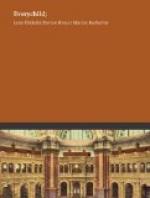Without looking up from the Book of Truth (for this was the volume in which she was writing) the Masked Lady replied: “Did you say that this place is genuine?”
“Of course,” said Mr. Literal. “We are in a medieval castle in Northampton—the castle of King John of England. King John or his chamberlain is likely to enter at any moment. And goodness knows what they’d say at finding you here.”
The Masked Lady turned a page. “King John would not see me here if he were to enter,” said she; “no, neither here nor anywhere. And as for honest old Hubert de Burgh . . . well, perhaps I have a purpose in being here. You have said this place is genuine; yet I sometimes wonder if any place in all the world is so unreal as the palace of a king.” She gazed before her dreamily for an instant and added, “I can see a day coming when all such palaces will be viewed by wondering, emancipated people, their minds filled with incredulity: because they will realize that kings’ palaces have represented the most terrible delusion of all.”
There was a footfall without at that moment, and the Masked Lady resumed her writing.
A bluff, soldierly-appearing man of middle age entered the room: a bearded man of harsh visage, yet with an eye in which justice sat enthroned. He looked about the room with an air of dawning relief; and when two villainous-looking rascals followed him into the room he remarked, with a sigh: “He’s not here. And that’s a bit of luck at least—to have no one about whilst we mix this devil’s brew.” Then more briskly: “A red-hot iron—red-hot, do you hear?—in a hurry!”
The first attendant, to whom he had spoken, glanced darkly at the second door of the room, which remained closed. “A hot iron? Yes, sir,” he said, trying to speak naturally. “It shall be prepared.”
The second attendant seemed incapable of remaining silent—after the manner of sorry men. “It will be quite simple, sir,” he said.
Hubert de Burgh (for the soldierly-appearing man was he) turned upon them fiercely. “Enough!” he exclaimed. “I don’t know how men of your breed go about a task like this, but Hubert de Burgh has always faced the truth. Listen: When you’ve fetched me the hot iron you’ll hide behind the tapestry there. And when I stamp on the floor you’ll come quickly and bind him hand and foot.”
The first attendant found courage to say: “Bind him? A little lad like that? A man might do the job with one hand without half trying.”
But Hubert de Burgh gazed at the man darkly. “Look you, fellow,” he said, “there are forces besides a man’s hands which are powerful. His very helplessness and innocence . . . I think they shall paralyze my hands and make me helpless. Do as I say: bind the boy and stand near, ready to lend a hand.”
Whereupon the first and second attendants withdrew, staring as if with terror at the unopened door near which they had to pass.




